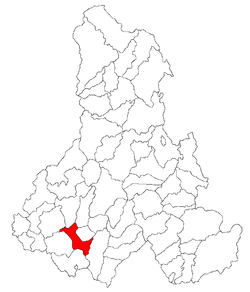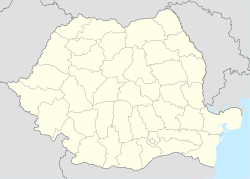Feliceni
|
Feliceni Felsőboldogfalva |
|
|---|---|
| Commune | |
 |
|
 Location of the commune |
|
| Location of the commune | |
| Coordinates: 46°16′0″N 25°16′0″E / 46.26667°N 25.26667°ECoordinates: 46°16′0″N 25°16′0″E / 46.26667°N 25.26667°E | |
| Country |
|
| County | Harghita County |
| Status | Commune |
| Government | |
| • Mayor | József Sándor (Democratic Union of Hungarians in Romania) |
| Area | |
| • Total | 78.91 km2 (30.47 sq mi) |
| Elevation | 601 m (1,972 ft) |
| Population (2011) | |
| • Total | 3,026 |
| • Density | 38.37/km2 (99.4/sq mi) |
| Ethnicity (2002) | |
| • Hungarians | 99.31% |
| • Romanians | 0.69% |
| Time zone | EET (UTC+2) |
| • Summer (DST) | EEST (UTC+3) |
| Postal Code | 537297 |
| Area code(s) | +40 266 |
| Website | www |
Feliceni (Hungarian: Felsőboldogfalva, Hungarian pronunciation: [ˈfɛlʃøːboldoɡfɒlvɒ], meaning "Upper Village of the Blessed", referring to the Virgin Mary) is a commune in Harghita County, Romania, in the vicinity of Odorheiu Secuiesc. It forms part of the Székely Land, an ethno-cultural region in eastern Transylvania.
The commune is composed of eleven villages:
The villages of the commune historically belonged to the Székely seat of Udvarhelyszék, then, from 1876 until 1918, to Udvarhely County in the Kingdom of Hungary. After World War I, by the terms of the Treaty of Trianon of 1920, they became part of Romania.
As a result of the Second Vienna Award, the region belonged again to Hungary between 1940 and 1944. After World War II, it came under Romanian administration and became part of Romania in 1947. Between 1952 and 1960, the villages formed part of the Hungarian Autonomous Province, then, of the Mureș-Hungarian Autonomous Province until it was abolished in 1968. Since then, the commune has been part of Harghita County.
The commune has an absolute Székely (Hungarian) majority. According to the 2002 census it has a population of 3,026 of which 99.31% or 3,005 are Hungarian
Polonița (Hungarian: Székelylengyelfalva, or colloquially Lengyelfalva, Hungarian pronunciation: [seːkɛjlɛnɟɛlfɒlvɒ], meaning "Poles' village") is located along the Polonița (Lengyelfalvi) Creek in a narrow valley. It had 319 inhabitants in 2002 (down from 503 in 1910), of whom 315 were Hungarians.
...
Wikipedia

